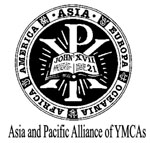|
During the field visit, the participants had the opportunity to visit Loung Neur Village in Doi Saket district which was home to Thai Leue tribe. They also visited Bor Sang Handicraft village located in Sankhampaeng District. The field visit emphasizes the importance of alternative tourism in reducing carbon footprints. The participants also visited the Energy and Environment Learning Center in Sao Hin YMCA which aims to promote environmentally friendly and low carbon life style. Ms. Patcharin Aviphan, Director of Sao Hin YMCA, also shared her experience on how to set up Green Team and promote Green Activities in their school and organizations. Participants gained ideas on how to set up their own green exhibit on their respective YMCAs, schools and organization.
On the final day of the training, Dr. Wasan Jompakdee, from The Coordinating Committee for the Protection of the Ping River Basin and the Environment, also gave a lecture titled, “Civil Movement for Environmental Preservation.” The lecture encourages the participants to engage and be active in environmental advocacies and green programs from different organizations.
Before the training ended, the participants brainstormed together and developed action plans describing what environmental practices they are going to apply to their individual life, their community and their own YMCAs. Interesting activities are to set up Green Team in YMCA and school, awareness raising on climate change education, reduction of carbon emission and carbon footprint from daily life, environment conservation and electricity saving. Promote Green School and low carbon community garbage management and waste deduction including tree planting, growing organic vegetable as well as making compost.
This training was a wonderful learning experience for a participant like me and will invariably encourage me to do more environmental programs in my YMCA and also be environmentally sensitive in my personal life. I am grateful to the organizers to give me the opportunity to participate in this program.
~ Chanthanome Chittavanh (Kimmy) / YMCA Group, Luang Probang, Laos
Basic Training for YMCA Secretaries held at YMCA Philippines
Six delegates from five different countries in Asia; Philippines, Cambodia, Indonesia, Mongolia and Thailand, participated at the Basic Training for YMCA Secretaries held on September 1-21, 2017 at the YMCA of Makati, Metro Manila, Philippines. This is for the first time APAY has organized this training with collaboration of the YMCA of Philippines.
The participants were: Alice Encinas, Administrative Assistant of YMCA of Manila, Philippines; Ma. Magda Gana, Programs Secretary of YMCA Makati, Philippines; Evie Candra, Volunteer of YMCA Salatiga, Indonesia; Chantouch Nou, Administrative Assistant of National YMCA of Cambodia; Phongnarin Suwanma, Program Staff of YMCA of Chiangmai, Thailand; and Mungktsog Davaadorj, National General Secretary of YMCA of Mongolia.
The delegates were warmly welcomed by the President of Makati YMCA, Dr. Reynaldo Echavez in a lunch hosted by the National President of the YMCA Philippines, Dr. Ramona Morales on the first day. The next day was Program Orientation and Life Sharing Session facilitated by the National General Secretary (NGS) of the YMCA Philippines, Mr. Pablito Tabucol. The participants were given a chance to share their life stories with the group which encouraged a spirit of camaraderie and fellowship among them.
The following two days focused on understanding the Christian faith, with speakers: Atty. Eduardo Pilapil, who talked about the “Contemporary Theological Perspective” and “History of Christianity”; and Bishop Tex Gabo, who discussed on the “Study of Ecumenism” and “Understanding Worship and Liturgy”, the participants were able to recollect on the importance of the “C” in the YMCA and its cultivation in and outside the movement.
In the next two days, the speaker, Professor Elmer Ferrer, talked about “Contextual Realities and Responses”. The main theme of his lecture is being mindful of a perspective which includes understanding of situation, having a clear vision and knowing how to realize it. He also talked about the “Regional and Global Perspective on YMCA Mission” where he shared the realities and challenges of globalization and how the YMCA is responding to it and how an individual should respond to it starting with a simple lifestyle.
YMCA History, Philosophy and Purpose were given emphasis by speaker NGS Pablito Tabucol on the sixth and seventh day. He started with the story of George Williams and Henry Dunant leading to the formulation of the Paris Basis of which he highlighted four main points: “unity among peoples of all faith”; “extension of God’s kingdom (reign)”; “becoming disciples of Christ in their faith and life” and “amongst young people”. He also shared the notable contributions of the YMCA throughout the world history and the development of the YMCA triangle, Mission statement expressed in the Challenge 21 and the World Alliance of YMCA’s (WAY) Strategic Plan and Asia and Pacific Alliance of YMCA’s (APAY) Quadrennial Program Plan (2016-2019).
The next resource person was the General Secretary (GS) of YMCA Albay, Ms. Tintin Aquino who talked about Program Development and Management and Advocacy Work and Inter-movement Cooperation. She taught the participants how to create project proposals, program plan and evaluation and monitoring tools. She discussed on techniques on data gathering and community organizing. She also shared the different APAY Thrust Areas; Youth Empowerment, Disaster Response, Environment and Climate Change, Gender Mainstreaming, Global Alternative Tourism Network, Peace and Justice and Movement Strengthening.
The tenth to eleventh day of the CDP were full-packed with learnings on Resource Generation Management. Topics on this module include the “Principles of Administration and Management” which was discussed by the GS/Director General of YMCA Manila, Orlando Carreon who inspired the participants to always seek to work for the betterment of the Association. He emphasized the Staff and Lay Leader Partnership in the YMCA. He was then followed by their former GS/Director General of Manila YMCA, now the APAY Coordinator for Movement Strengthening, Thelma Juntereal, who talked about the “Principles and Techniques of Fund Raising and Resource Mobilisation”. She stressed the importance of resource management and mobilisation to assure sustainability of the movement.
On the following day, the External Auditor of YMCA Makati and Manila, Imelda Ramos talked about Budgeting Process, Basic Accounting and Auditing and Financial Management and Internal Control Systems which inculcated to the participants the observance of honesty, integrity and transparency in managing financial resources. The participants were also able to learn from speaker Merly Adaza of Cagayan De Oro YMCA tips on guidance counseling, conflict resolutions and peer support and helping relationships.
The remaining lectures on the fourteenth and fifteenth day were given by APAY Executive Secretary, Duncan Chowdury who talked on Governance Structures and Policies in the YMCA. He gave the participants perspective on the YMCA structure from the World Council, Regional Alliances to the National and Local movement; the Roles of Board, Elements of Constitution and By Laws and Board Meetings. He also reiterated the Paris Basis and its key components expressed in the Kampala Principles. He also shared the three pillars of the Movement Strengthening: Mission Clarity, Institutional Viability and Social Relevance.
For following two days the participants were sent to two different local YMCAs; Pangasinan and San Pablo, for community exposure and for them to see how they manage their YMCAs, their programs and finances and how the theories they have learned the past days can be applied. After coming back from the local YMCA exposure the participants drafted their respective project proposals and presented it to the panel before they all had an exit interview with the National President and the National General Secretary.
The program culminated with a closing worship where the participants received their certificates of completion and made their commitment to the YMCA on September 21, 2017 in Makati, Philippines.
~ Ma. Magda R. Gana, YMCA of Makati, Philippines
Change Agents Global Gathering
The Change Agent Global Gathering held at Setubal, Portugal last September 1-10, 2017 was represented by Team APAY with 30 youth leaders and staff from the National Movements of Australia, Cambodia, Hong Kong, Japan, Myanmar, Mongolia, New Zealand, Philippines, Sri Lanka and Taiwan. The APAY Change Agents, together with the Change Agents from Africa Alliance of YMCAs and European Alliance of YMCAs, comprised the 149 youth participants to this first global gathering.
Team APAY actively participated in various work group session, working committees and some led workshop sessions on the following topics:
- The Bridge Project, Australia
- Youth and Suicide, Sri Lanka
- Child Protection, Australia
- Youth & Parliament, Australia
- Gender Equity, APAY Executive Secretary
The global gathering for Change Agents centered on the World YMCA youth empowerment strategy. Specific topics include civic engagement and human rights, health, and employment. The agenda also featured discussion of opportunities regarding the One Million Voices research, as well as initial preparations for World Council 2018, which will be the second global gathering in July 2018.
The global gathering featured active leadership of Change Agents through various training sessions that will be developed and delivered by Change Agents. This event emphasized peer learning and opportunities for Change Agents to share knowledge and practice their skills in designing and facilitating training events.
 |
|
 |
| ↑ Team APAY wears cultural dresses during the Change Agents Global Gathering Party Night |
|
↑ APAY youth actively participates during work group sessions
|
 |
|
 |
↑ Rose from Myanmar YMCA leads worship team in
singing gospel songs
|
|
↑ Change Agents sing "We Are One"
|
~ Maria Cristina L. Miranda
YMCA of Indonesia Board Development Program
One of the initial action seen as necessary in revitalizing and strengthening the YMCA of Indonesia is the development and enhancement of the national board leadership, being the highest authority in pursuing and achieving the mission, goals and objectives of the association. This was considered during their National assembly and annual General meeting conducted in April. In a way, it was hoped that making the national board stronger will redound to the growth of the local YMCAs too through their effective governance. Their leadership will impact and influence the local YMCAs to be energized and stimulated as well. Thus, on September 16, a One-day Board training workshop was held in Wisma PGI Teuku Umar in Jakarta participated in by the board and the staff. The workshop basically intended to : 1) increase and deepen the understanding and consciousness of the board about the YMCA, its mission, vision and its basis of work; its structure and relationship; 2) the roles of the board as a governing body vis a vis the staff; 3) introduction on the Movement Strengthening, its 3 pillars - mission clarity, social relevance and institutional viability; 4) review of the 3-year strategic planning.
The workshop, based on the topics discussed and the sharing of insights, were able to assist and facilitate the participant’s awareness, understanding and appreciation of the YMCA history, its vision and mission, particularly the Challenge 21, its contemporary mission encouraging them to respond to the challenges contained in the mission applicable to their context. It also made them aware of the structure of the global YMCA , from the world office, the region, the national, down to the local YMCA and the important role each body plays in pursuing the mission.
In the same manner, the important role of the board, as the policy making body and the staff as the policy implementer were looked into and distinguished. However, harmonious working relationship and partnership between the two was defined and emphasized to effectively achieve the YMCA goals. The participants also had the opportunity to do institutional diagnosis assessing their current situation and realities , re- evaluate their strategies and approaches on how to find ways and address their issues and concern. Finally, discussion and review of the Strategic plan presented during the General Assembly was done where the following were set as their focus to achieve their goal of rebuilding and strengthening anew the YMCA of Indonesia : 1) organizational strengthening; 2) program development; 3) strengthening local YMCAs; 4) financial sustainability; 5) documentation and publication. Over-all, YMCA of Indonesia aims to enhance their leadership capabilities; engage in more relevant and significant programs; empower the local YMCAs to be more effective in promoting their respective programs and services; be sustainable and self -reliant and create public awareness about the YMCA so as more people will be deeply involved in the YMCA work.
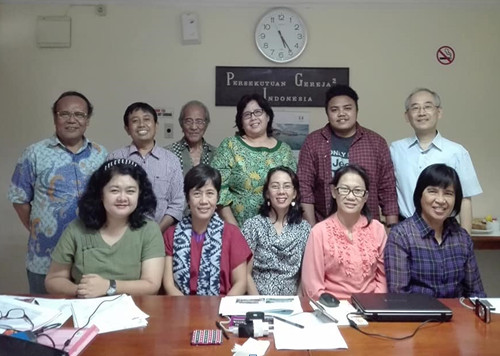 |
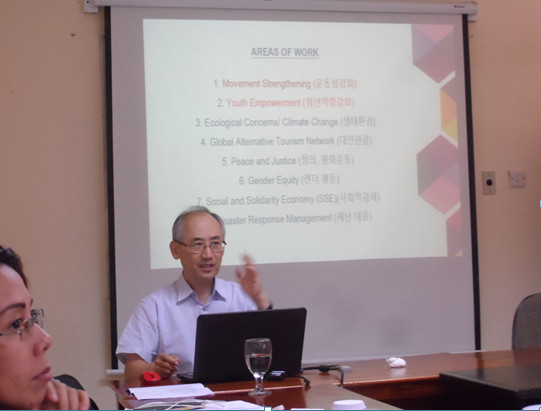
|
↑ Participants to the Board workshop together with the
APAY staff |
↑ Mr. Nam Boo Won, APAY GS discussing the YMCA history, mission and vision and its areas of work |
May this undertaking usher the rebirth of the YMCA of Indonesia and make the leadership and the general membership more motivated , enthusiastic and high- spirited in working and attaining the YMCA goal.The workshop was attended and facilitated by Mr. Nam Boo Won, APAY General Secretary and MS Coordinator Thelma Juntereal.
~ Thelma P. Juntereal
SOP Alumni serve as Resource People for 2017 SOP
Interfaith Cooperation Forum (ICF) seeks to utilize the skills and experience of its School of Peace (SOP) alumni as much as possible in its work. At this year’s SOP being held near Yogyakarta, Indonesia, ICF has once again followed this path.
First of all, Lioni Beatrik Tobing, who attended SOP in 2008 and who is the ICF national forum coordinator for Indonesia, did all of the local logistical preparations before the program began on July 15 and is attending the entire three-month program. Other SOP alumni who have contributed to the program are Barce Rumkabu (SOP 2012) and Marthen Sama (SOP 2015) who shared about issues in Papua where they live, Gunawan (SOP 2010) from Poso in the Indonesian province of Central Sulawesi who conducted sessions on drama with ICF staff member Hem Sopharak as part of the tools for transformation sessions and Khamid Anik Khamim (SOP 2007) from Jakarta who assisted ICF staff member Bruce Van Voorhis with the human rights sessions. In addition, Gunawan and Suwarti Ningsih (SOP 2010) from Poso organized the four-day field trip beginning on Sept. 26 in Poso and Palu.
Inputs at SOP in September were also provided by Chan Beng Seng, APAY staff member, about global economics, the structures of injustice and the violence of development.
As well as the field trips and sessions, the SOP participants commemorated the U.N. International Day of Peace on Sept. 21 by co-organizing a Festival of Justpeace with a local Catholic church in Yogyakarta and performing a drama about land-grabbing and discrimination against LGBT people at the event.
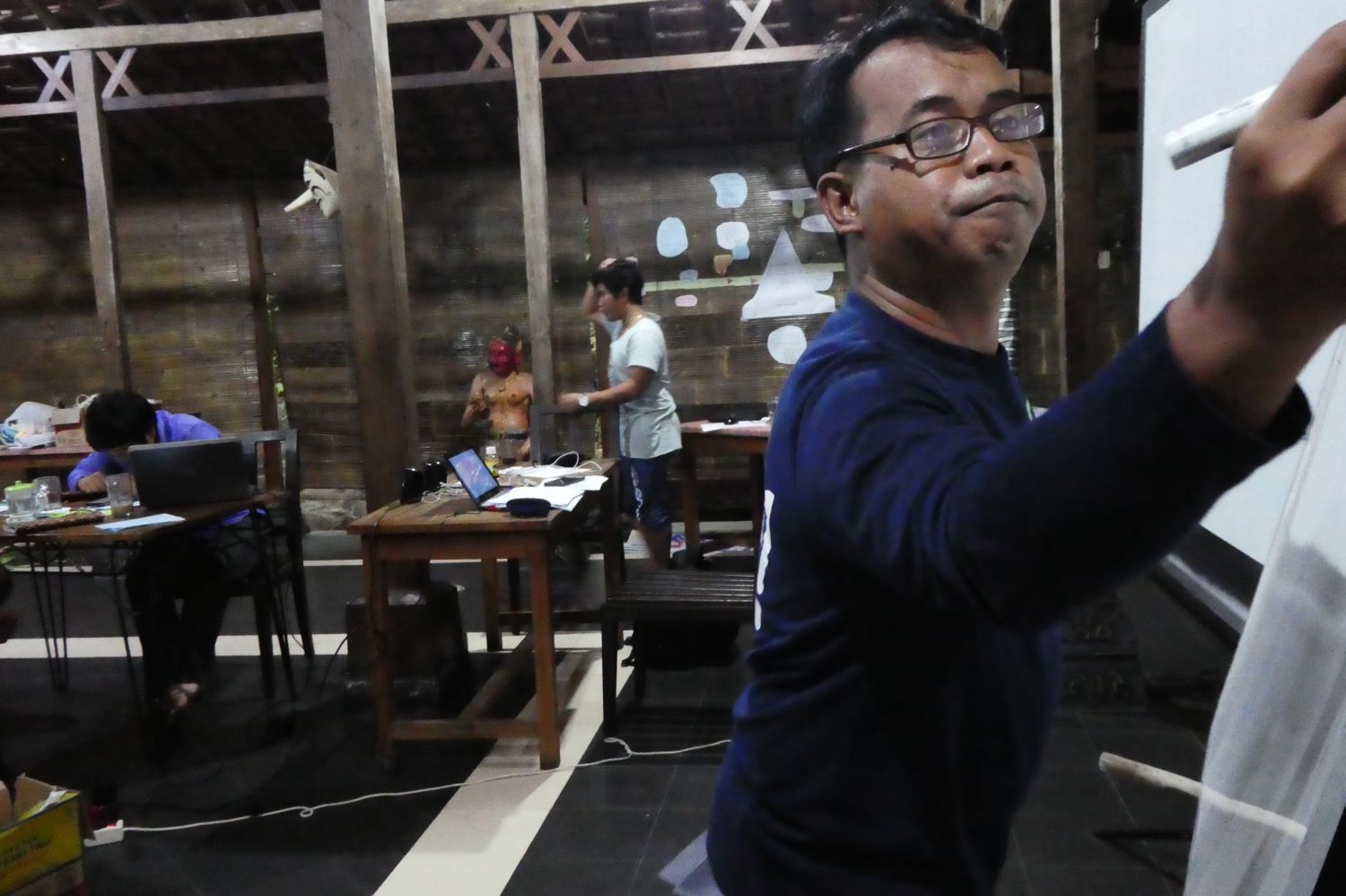 |
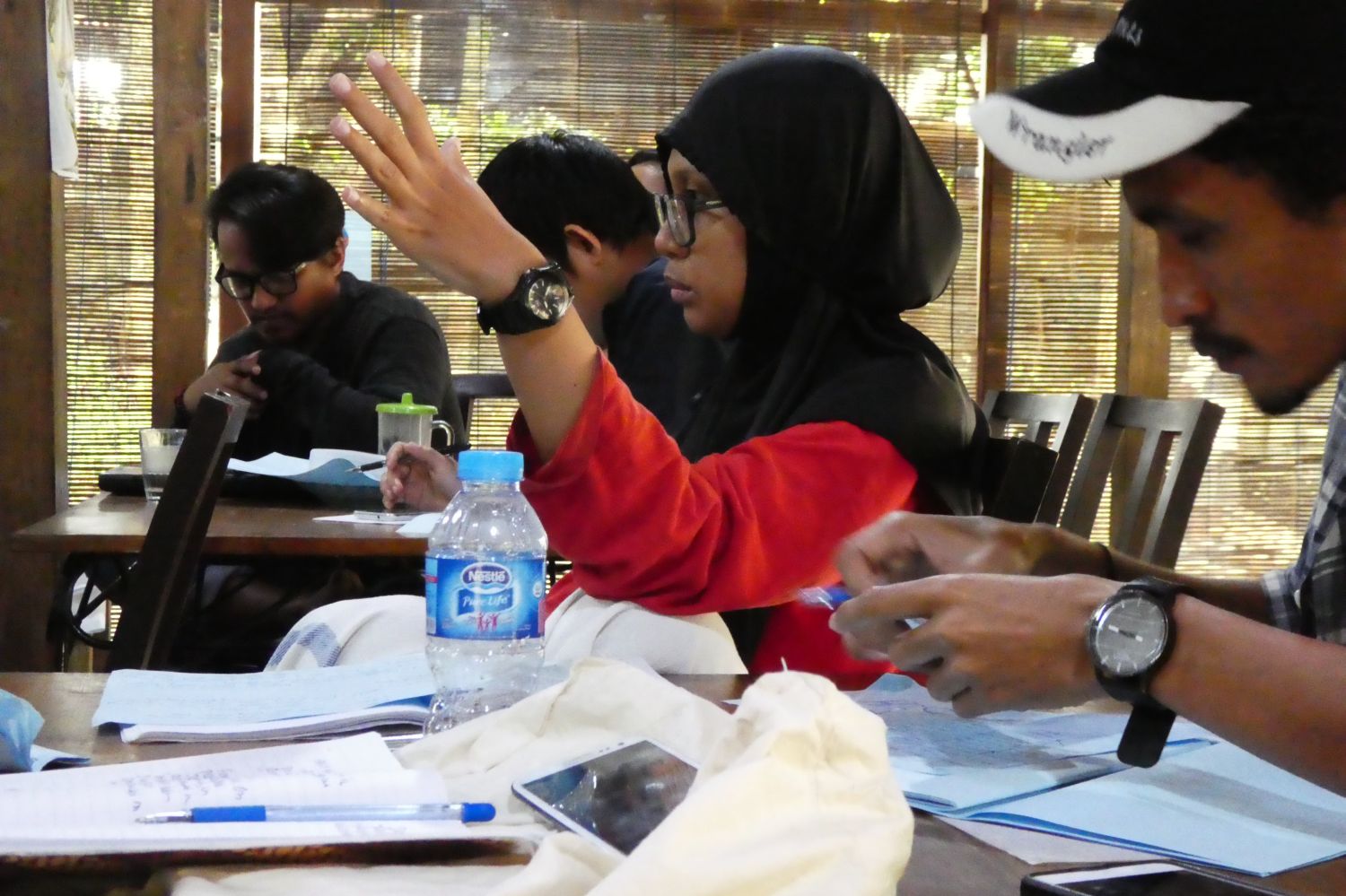 |
| ↑ Khamid Anik Khamim, who attended SOP in 2007, leads a session on human rights at this year's SOP in Indonesia
|
↑ Tri Astuiti, center, shares her views about human rights in Indonesia at SOP
|
~ Bruce Van Voorhis
GATN Programs in YMCA of Mongolia
To learn about community involvement and the value of simple living - this is the heart of the GATN programs of YMCA of Mongolia.
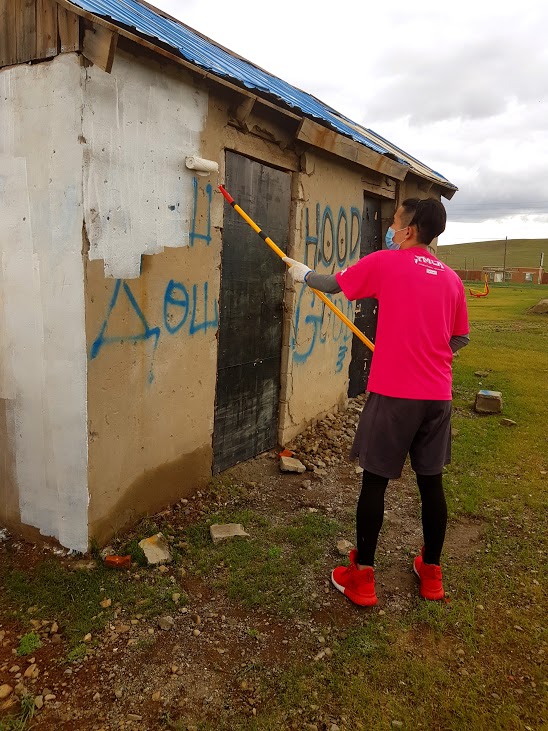 |
↑ Volunteering to do repair works in the communities
partnered with the YMCA
|
Working closely with the partner orphanage where children aged 8-16 years old are housed and cared for by a local pastor and his family is a precious experience for the participants. You can help in several ways such as doing green projects within the property of the orphanage or helping in the repairs and upkeep of the building. Yet still, one of the most significant things to do is to spend time with kids through craft projects, games and other learning activities. A deeper sense of fulfillment dawns when one gets to connect with the local people and affect their lives even in a simple way.
More connections can even be forged through its rich cultural exchange. Participants can stay with Mongolian families in the gers (yurts/traditional felt tents) to learn about Mongolian rural life. These Gers are what the Mongolians have lived in for centuries. In fact, through the Ger building activity and Naadam Festival, participants will not only help to build their own Ger but also learn about the traditional sports of Mongolia namely wrestling, archery and horseback riding. In these local communities, more opportunities to volunteer are available like cleaning, painting and other minor repairs.
Teams that visit Mongolia can connect with public schools to learn more about the state of public education. Efforts to support the schools and its students are carefully determined by the school leaders and the YMCA. Noting from past experiences, these span from giving school supplies to children to helping in building and caring for the school dormitories. Likewise, teams may also conduct English Camp at a local public school outside the city. You can see from this experience how students love being able to practice their English and improve their learning with the volunteers.
These are only some of the activities, a GATN program in Mongolia offers. Apart from this, experiencing Mongolian life through hiking various mountain routes while cleaning up garbage on the trails and learning about recycling and other environmental issues impacting the country is an enjoyable method implored to make this GATN program nature and heritage sensitive. They may also conduct other activities like Horseback Riding, Kayaking and expeditions in Gobi Desert and Khusvgul Lake.
GATN programs can be hosted by YMCA of Mongolia at any point of the year with each season bringing a different angle of the beauty of the country and a wonderful opportunity to be engaged in the communities. Not only will they know more about one of the last countries in the world still having a significant nomadic community, but they will be able to go deeper into the heart of every community programs YMCA of Mongolia offers.
Through its GATN programs, YMCA Mongolia aims to educate the visitors and the locals of issues that largely affect communities in the country. Most of all, the program emphasizes learning about teamwork, communication and thoughtful cultural exchange.
For YMCA of Mongolia, they wish participants to leave with a better understanding of the country, themselves and their place in the larger world and in their own communities.
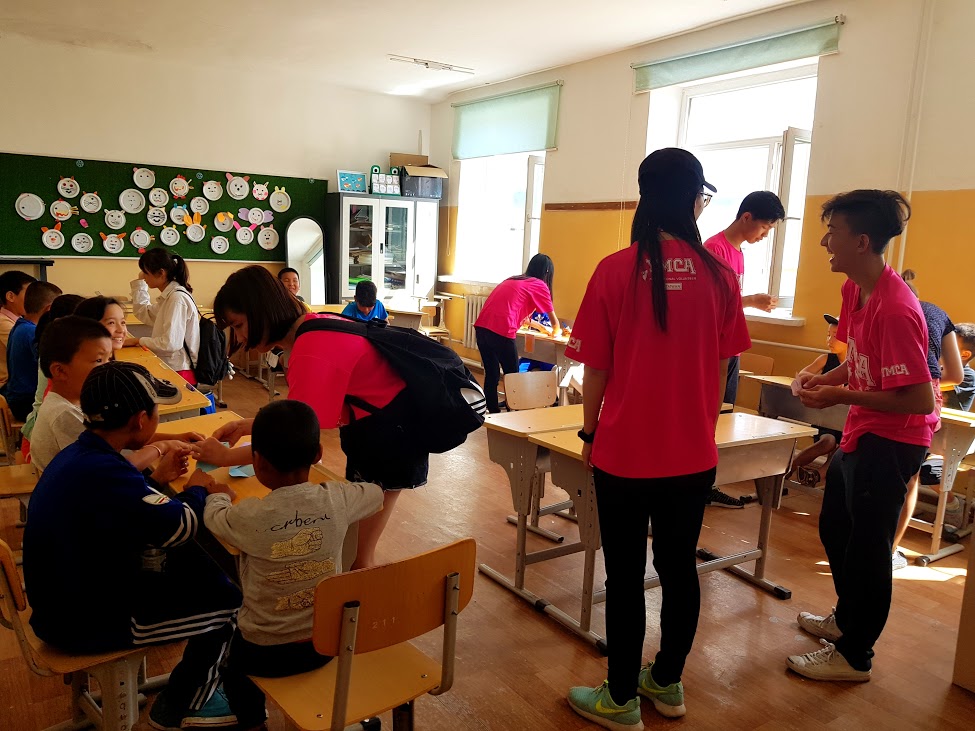 |
| ↑ The Volunteers conducting classes with kids in a school in Mongolia
|
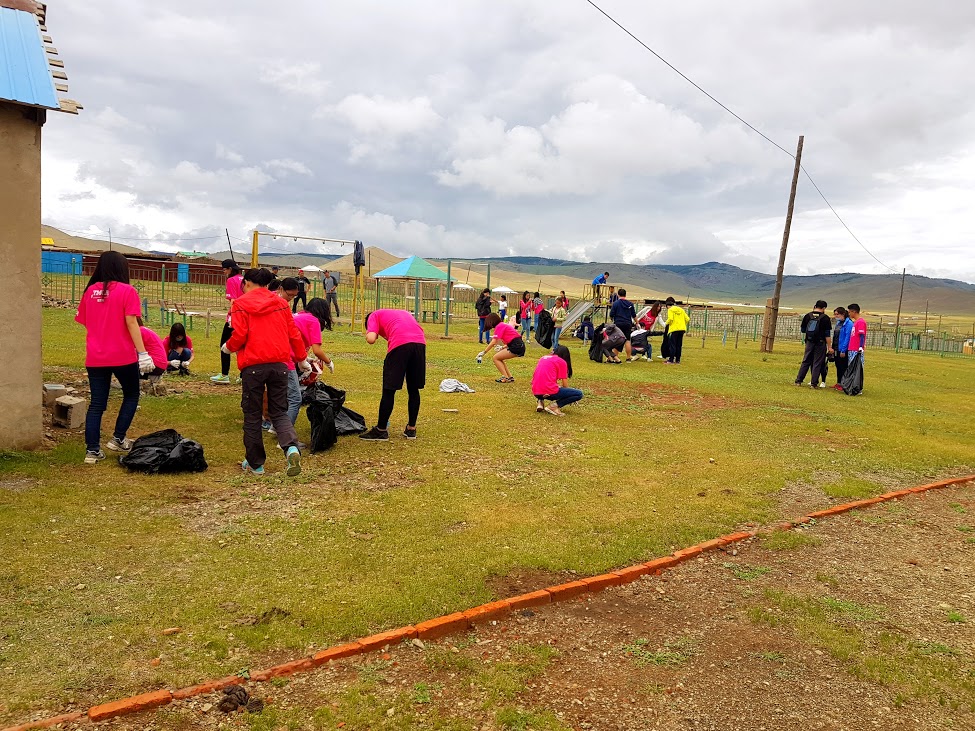 |
| ↑ GATN participants doing environmental activity in YMCA of Mongolia
|
~ Karren Joy Fetalvero
Guangzhou YMCA visit by GS Nam Boo Won
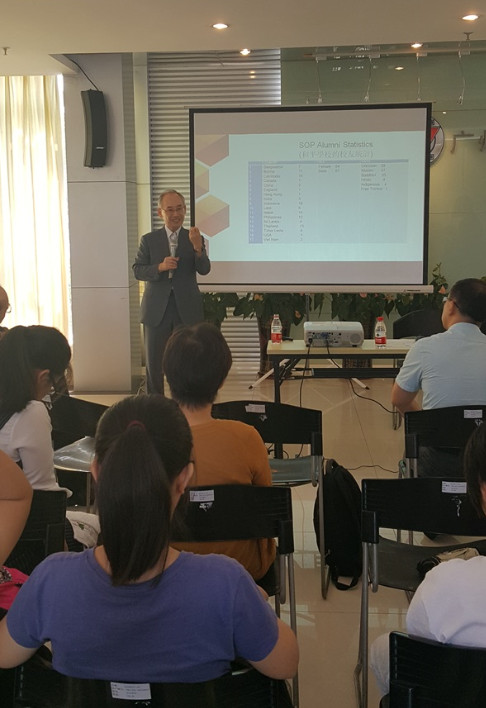 |
↑ Nam Boo-Won presenting "Purpose, Role and Work
of APAY" to the staffs of Guangzhou YMCA
|
Invited by Mr. Guo Yun, General Secretary of Guangzhou YMCA, China, the nearest local YMCA from APAY by distance, APAY General Secretary Nam Boo-Won made a two days visit to the YMCA. “This was a great opportunity for me to meet with all thestaff members of the Guangzhou YMCA. Furthermore, I was able to familiarize myself with the activities/programs of the YMCA. Mr. Guo Yun was so thoughtful as to give me two hours for my presentation on"The Purpose, Role and Work of Asia and Pacific Alliance of YMCAs" at the gathering of more than 70 staffs of Guangzhou YMCA, which was followed by challenging questions and discussions in an open and frank manner”. Nam shared with them why APAY as regional alliance exists and what kind of cooperation and collaboration can be made between APAY and YMCA China including Guangzhou YMCA.
“All the staffs attending the session were actively listening and made me made me really enjoy interactions with them on several questions and issues on the YMCA mission and social relevance”. To the eye of GS Nam, many of the staffs were young and energetic, ready to serve people in need in the rapidly developing society. Though the third sector or non-profit sector in Chinese society is at the stage of formation, it is evident that the hugely increasing need for social welfare and social work will inevitably demand the expansion of voluntary and civil sector as a mutually benefitting counterpart in the future.
“I was also privileged to visit two Integrated Family Service Centers – the Hualin and Shiweitang Community Centers – commissioned by the city government, serving many families in their vicinity, particularly elderly and disabled people. At a dinner meeting with Mr. Wang, Executive Director of Religious Department of Guangzhou city, I could sense the partnership between city government and Guangzhou YMCA has been well developed in mutual trust and collaboration in serving their people and communities. He was willing to support Guangzhou YMCA to become more active even in its international relation and partnership with overseas YMCAs”.
Apart from the YMCA visit, Nam had a chance to visit and see the Museum of the Western Han Dynasty – Mausoleum of the Nanyue King guided by Mr. Ng Kin Sun, former Executive Secretary of Chinese YMCA of Hong Kong who has long been volunteering to mentor the social work staffs in Guangzhou YMCA. Next day, Nam was also guided by GS Guo Yun and his staff to visit the Ghuangdong Museum to learn about the long history, legacy and culture of southern China.
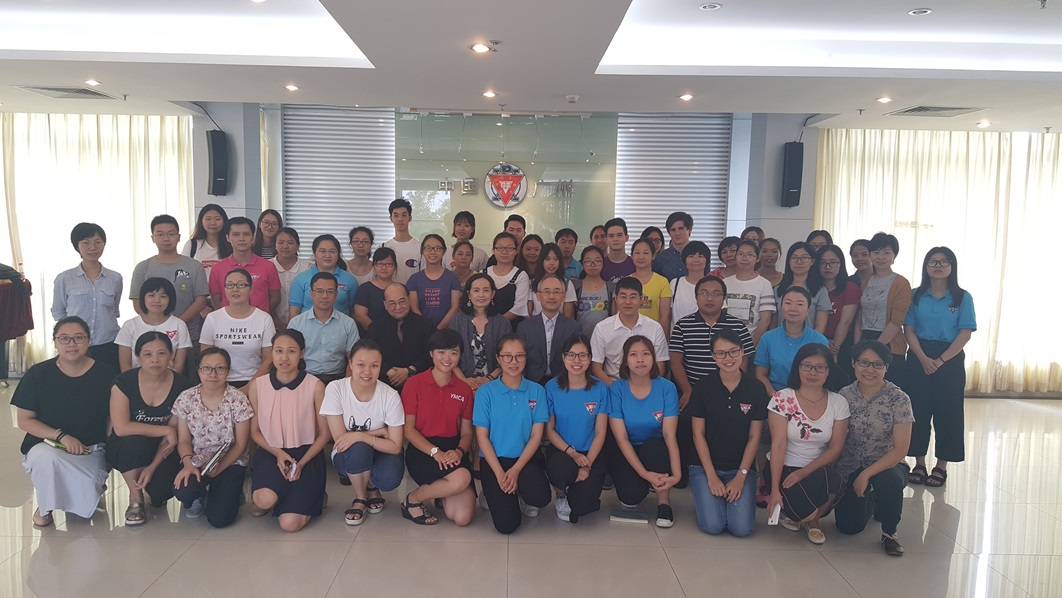
|
| ↑ Photo with staffs of Guangzhou YMCA at the YMCA's headquarter |
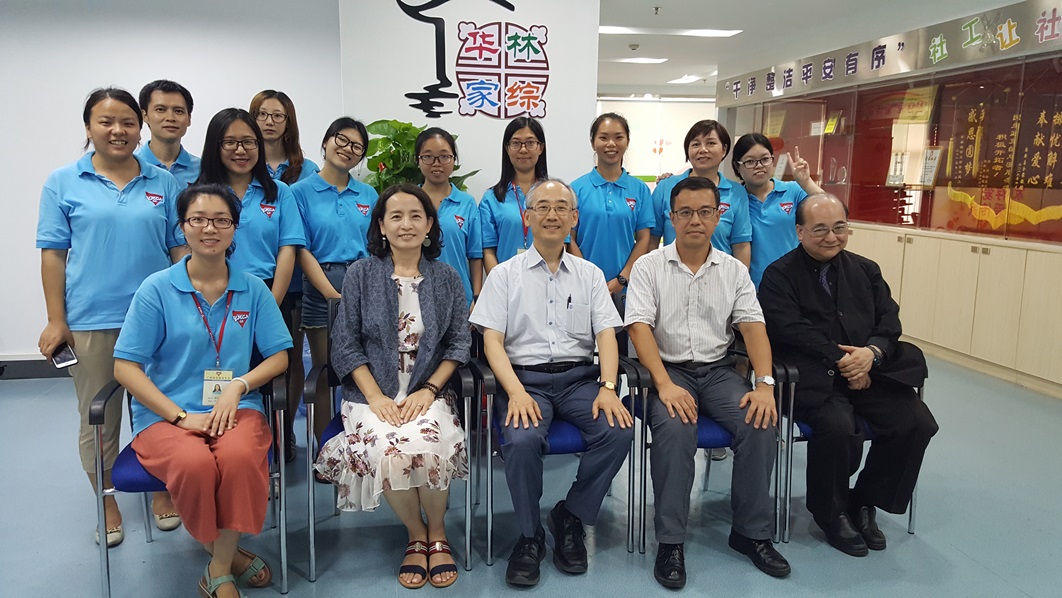
|
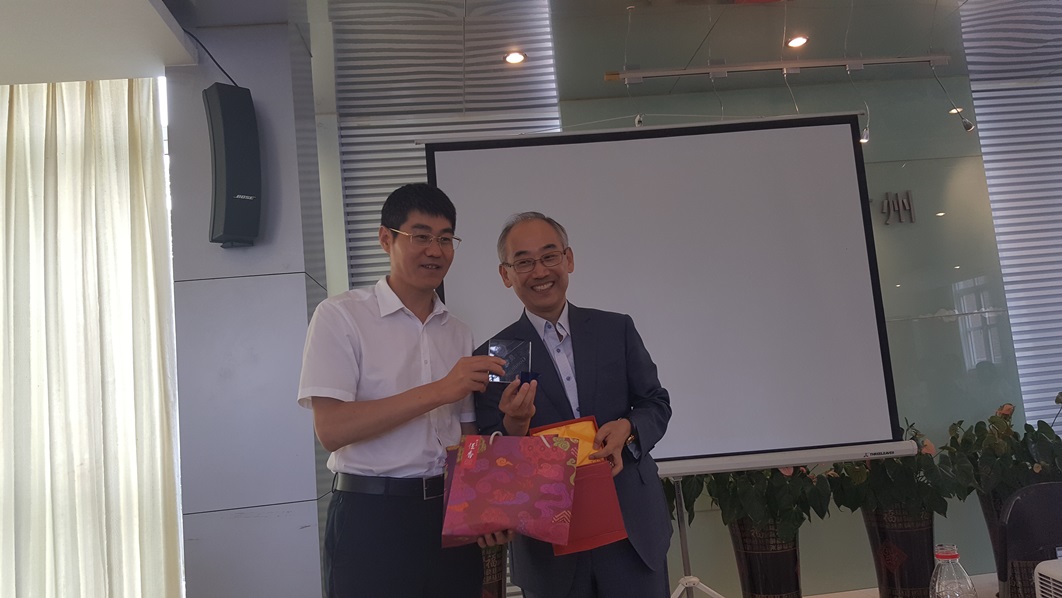
|
↑ Photo with staffs of an Integrated Family Service Center
of Guangzhou YMCA
|
↑ GS Nam is exchanging gifts with Mr. Guo Yun,
GS of Guangzhou YMCA
|
“While I was returning to Hong Kong by train, I reached a temporary conclusion that the growth of the third sector, along with the growth of economy as well as state power, is crucial and key to the holistic and sustainable development of Chinese society in the years to come. More importantly, I was able to see a bright future of the China YMCA from the glittering eyes of those many young staffs working hard with devotion. They are the very generation who will expand and strengthen the third sector in China through YMCA movement in solidarity with like-minded NGOs and NPOs in the near future”. As had been in England more than 170 years ago, God will speak in different ways in different times, and in different places. APAY is so grateful to Mr. Guo Yun, GS of Guangzhou YMCA for his kind invitation and willingness to work more closely with APAY in many possible ways.
~ Nam Boo Won
|
